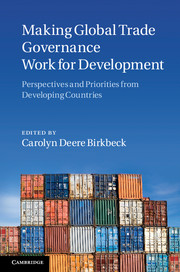 Making Global Trade Governance Work for Development
Making Global Trade Governance Work for Development Book contents
- Frontmatter
- Contents
- Figures
- Tables and boxes
- Contributors
- Acknowledgements
- Introduction
- Part I Global trade governance
- Part II Roles and responsibilities in global trade governance: diversity in developing country priorities and strategies
- 5 New powers in the club: the challenges of global trade governance
- 6 China’s ascent in global trade governance
- 7 LDC priorities for improved global trade governance
- 8 Priorities for small States in global trade governance
- 9 Improving the participation of small developing countries in the governance of the multilateral trading system
- Part III Strengthening multilateralism
- Part IV Making WTO negotiations and decision-making processes fairer
- Part V Conclusion
- Index
- References
9 - Improving the participation of small developing countries in the governance of the multilateral trading system
from Part II - Roles and responsibilities in global trade governance: diversity in developing country priorities and strategies
Published online by Cambridge University Press: 07 September 2011
- Frontmatter
- Contents
- Figures
- Tables and boxes
- Contributors
- Acknowledgements
- Introduction
- Part I Global trade governance
- Part II Roles and responsibilities in global trade governance: diversity in developing country priorities and strategies
- 5 New powers in the club: the challenges of global trade governance
- 6 China’s ascent in global trade governance
- 7 LDC priorities for improved global trade governance
- 8 Priorities for small States in global trade governance
- 9 Improving the participation of small developing countries in the governance of the multilateral trading system
- Part III Strengthening multilateralism
- Part IV Making WTO negotiations and decision-making processes fairer
- Part V Conclusion
- Index
- References
Summary
Given the overriding importance of international trade to the performance of small developing economies (SDEs) and their acute vulnerability to external economic events, these countries are vitally concerned with their place in the world economy and the nature of the rules and institutions governing the global economy.
For SDEs to achieve sustainable economic development, they need to reposition themselves in a strategic global sense. This repositioning will demand both changes in their internal development policies and the exertion of as much influence as possible to reshape the multilateral trading system, in particular as represented by the World Trade Organization (WTO) (Bernal 1996, 2000). As the core institution responsible for the creation and revision of the rules that govern multilateral trade, and for the adjudication of disputes arising from differences in interpretation or application of those rules, SDEs should seek more effective participation and influence in the WTO governance. It is through changes in the decision-making processes and operations of the WTO that the multilateral trading system will respond more effectively to the interests, concerns and objectives of the SDEs. Notably, the importance of the effective participation of SDEs in global governance goes beyond the ambit of international trade to encompass governance in other multilateral institutions, including the United Nations (UN), the International Monetary Fund (IMF) and the World Bank (Buria 2003; Portugal 2005: 2; Woodward 2005: 5; Woods and Lombardi 2005; and Truman 2006), but the focus of this chapter is on the international trade regime.
- Type
- Chapter
- Information
- Making Global Trade Governance Work for DevelopmentPerspectives and Priorities from Developing Countries, pp. 231 - 258Publisher: Cambridge University PressPrint publication year: 2011
References
- 1
- Cited by
